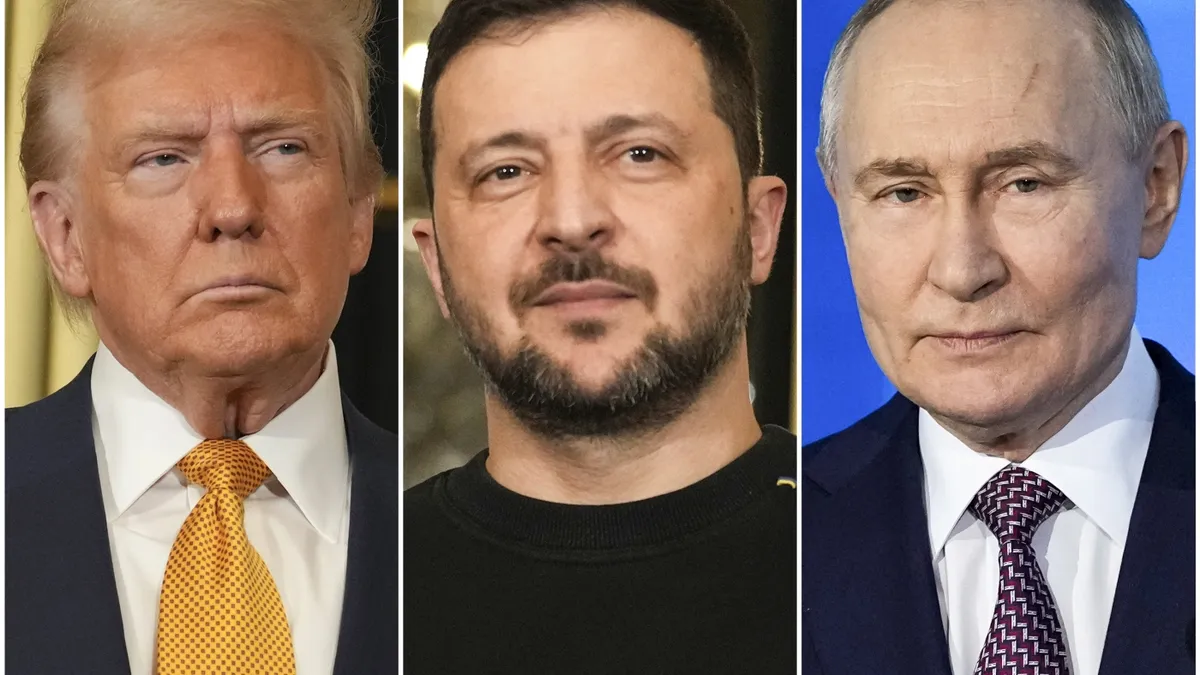
MOSCOW — President Donald Trump has announced that he is swiftly moving forward with plans to meet with Russian leader Vladimir Putin in Alaska this Friday. This unexpected summit aims to further Trump's ongoing efforts to negotiate an end to Putin's war in Ukraine, marking a significant face-to-face encounter with the Kremlin leader. "Probably in the first two minutes I'll know if a deal can be made," Trump stated during a press briefing at the White House on Monday. When a journalist inquired about how he could determine this so quickly, Trump confidently replied, "Because that's what I do. I make deals."
The Kremlin has largely remained silent since confirming the summit's location in Alaska. Trump has indicated that Ukrainian President Volodymyr Zelenskyy is unlikely to participate in these discussions, which he characterized as a preliminary meeting to gauge Russia's demands for ending the conflict. Ukraine's exclusion from the summit has raised alarms in Kyiv and among European allies, who fear Trump may agree to significant concessions without Ukraine's involvement. Over the weekend, leaders from several European nations, including the U.K., France, Germany, and Poland, issued a statement emphasizing that "the path in Ukraine cannot be decided without Ukraine."
Despite these concerns, Trump expressed a desire to establish a direct dialogue between Putin and Zelenskyy, contingent on acceptable terms. "I'm going to meet with President Putin and I'm going to see what he has in mind," Trump said, adding that he would inform NATO, European partners, and President Zelenskyy following the summit. "Out of respect, I'll call him first," he assured the press.
Ukraine remains cautious about the upcoming summit. Zelenskyy acknowledged Trump's peace efforts but cautioned that Putin may attempt to manipulate the American leader. Trump conveyed his frustration regarding Zelenskyy's insistence on constitutional approval for territorial concessions, stating, "He's got approval to go into war and kill everybody, but he needs approval to do a land swap?" This sentiment underscores the complex dynamics of the negotiation process.
Zelenskyy has emphasized that any potential peace in Ukraine depends significantly on the West providing security guarantees. Yet, he reported in his nightly address that recent Russian military maneuvers suggest Moscow is preparing for renewed military operations. "Putin may be talking about peace, but certainly not getting ready for a ceasefire or an end to the war," he remarked.
With the summit announced only last week, planning has been rushed, leaving the specifics—such as the time, place, and duration of the meetings—largely unclear. Confusion also surrounds a recent meeting between White House special envoy Steve Witkoff and Putin at the Kremlin, leading to questions about what concessions Russia may offer in exchange for this high-level meeting. Trump reiterated his stance that a deal could involve territorial exchanges, stating, "There will be some landswapping going on." He added that any compromise would ultimately be for the benefit of Ukraine.
Publicly, Putin has shown little inclination to retract his maximalist demands, which include halting Ukraine's NATO ambitions and demanding disarmament. Pro-Kremlin analyst Sergei Markov noted that while grand gestures from Putin may be unlikely, he could offer minor concessions to influence Trump positively. "I think it's some kind of possibility for Putin to give a small gift to Donald Trump to keep him engaged in the peace process," Markov observed.
The announcement of the Alaskan summit has been met with enthusiasm in Russia, as it appears to delay Trump's threat to impose significant sanctions on Russian energy exports. Prior to this, Trump had been vocal about Putin's aggressive military actions against Ukrainian cities. In a recent meeting, Trump recounted a conversation with Putin, expressing frustration over the ongoing conflict and announcing plans for U.S. military support to Ukraine.
Putin's supporters view the upcoming summit as a significant diplomatic achievement, with some commentators describing it as a "masterclass in diplomacy." The choice of Alaska, a region with historic ties to Russia, has been celebrated as a strategic move. Kirill Dmitriev, the Kremlin's envoy for U.S. negotiations, has highlighted Alaska's Russian heritage, asserting that it underscores the region's cultural connections.
In a light-hearted yet revealing moment, Trump inadvertently referenced Alaska as "Russia" during a briefing, underscoring the historical context of the summit location. Russian nationalists have long argued for the return of Alaska, a sentiment that reflects the complex history that continues to influence current geopolitical tensions.